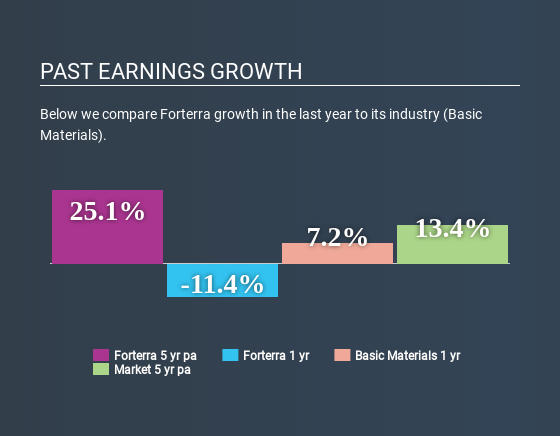Forterra plc's (LON:FORT) Stock Has Been Sliding But Fundamentals Look Strong: Is The Market Wrong?

It is hard to get excited after looking at Forterra's (LON:FORT) recent performance, when its stock has declined 22% over the past month. However, a closer look at its sound financials might cause you to think again. Given that fundamentals usually drive long-term market outcomes, the company is worth looking at. In this article, we decided to focus on Forterra's ROE.
Return on equity or ROE is an important factor to be considered by a shareholder because it tells them how effectively their capital is being reinvested. In simpler terms, it measures the profitability of a company in relation to shareholder's equity.
Check out our latest analysis for Forterra
How Do You Calculate Return On Equity?
The formula for return on equity is:
Return on Equity = Net Profit (from continuing operations) ÷ Shareholders' Equity
So, based on the above formula, the ROE for Forterra is:
30% = UK£47m ÷ UK£156m (Based on the trailing twelve months to December 2019).
The 'return' is the amount earned after tax over the last twelve months. That means that for every £1 worth of shareholders' equity, the company generated £0.30 in profit.
What Is The Relationship Between ROE And Earnings Growth?
Thus far, we have learnt that ROE measures how efficiently a company is generating its profits. Based on how much of its profits the company chooses to reinvest or "retain", we are then able to evaluate a company's future ability to generate profits. Assuming everything else remains unchanged, the higher the ROE and profit retention, the higher the growth rate of a company compared to companies that don't necessarily bear these characteristics.
A Side By Side comparison of Forterra's Earnings Growth And 30% ROE
First thing first, we like that Forterra has an impressive ROE. Second, a comparison with the average ROE reported by the industry of 14% also doesn't go unnoticed by us. As a result, Forterra's exceptional 25% net income growth seen over the past five years, doesn't come as a surprise.
We then performed a comparison between Forterra's net income growth with the industry, which revealed that the company's growth is similar to the average industry growth of 26% in the same period.
The basis for attaching value to a company is, to a great extent, tied to its earnings growth. The investor should try to establish if the expected growth or decline in earnings, whichever the case may be, is priced in. By doing so, they will have an idea if the stock is headed into clear blue waters or if swampy waters await. Has the market priced in the future outlook for FORT? You can find out in our latest intrinsic value infographic research report.
Is Forterra Efficiently Re-investing Its Profits?
Forterra has a three-year median payout ratio of 40% (where it is retaining 60% of its income) which is not too low or not too high. This suggests that its dividend is well covered, and given the high growth we discussed above, it looks like Forterra is reinvesting its earnings efficiently.
Upon studying the latest analysts' consensus data, we found that the company is expected to keep paying out approximately 45% of its profits over the next three years. Regardless, Forterra's ROE is speculated to decline to 19% despite there being no anticipated change in its payout ratio.
Summary
Overall, we are quite pleased with Forterra's performance. Particularly, we like that the company is reinvesting heavily into its business, and at a high rate of return. Unsurprisingly, this has led to an impressive earnings growth. That being so, a study of the latest analyst forecasts show that the company is expected to see a slowdown in its future earnings growth. Are these analysts expectations based on the broad expectations for the industry, or on the company's fundamentals? Click here to be taken to our analyst's forecasts page for the company.
This article by Simply Wall St is general in nature. It does not constitute a recommendation to buy or sell any stock, and does not take account of your objectives, or your financial situation. We aim to bring you long-term focused analysis driven by fundamental data. Note that our analysis may not factor in the latest price-sensitive company announcements or qualitative material. Simply Wall St has no position in any stocks mentioned.
Have feedback on this article? Concerned about the content? Get in touch with us directly. Alternatively, email editorial-team@simplywallst.com.

 Yahoo Finance
Yahoo Finance 
